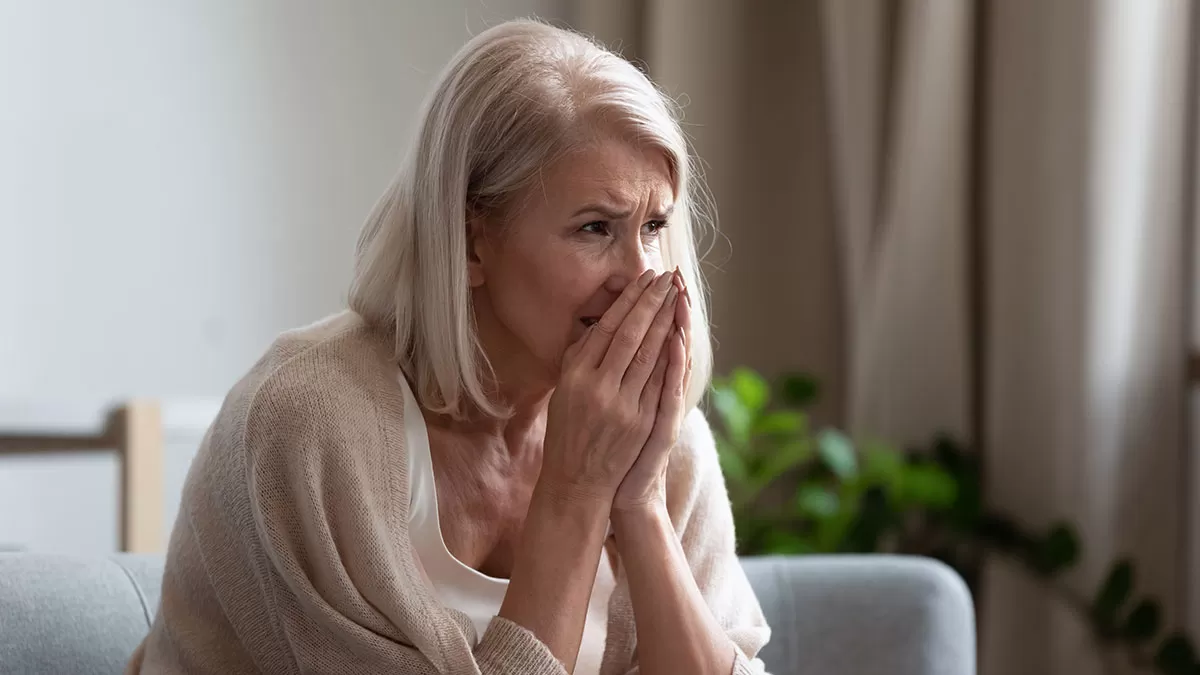Menopause anxiety is such an uncomfortable symptom to deal with as we age.
It’s bad enough we have to get through our hot flashes, night sweats, fatigue, insomnia, osteoporosis, and a list of other related issues, all combined.
Even still, perimenopause, menopause, and postmenopause all hit us in a different light. Some women get it worse than others, and some women are practically let off the hook.
All these lifestyle changes make us emotional and vulnerable to everyday life. Juggling what our bodies are going through and what’s going on in our minds can be tricky, especially at the same time.
That’s why overcoming things like anxiety and depression can be challenging and make us feel defeated. But that’s also why fully educating one another is the best solution.
Table of Contents [hide]
How Are Menopause And Anxiety Linked?
The most important change that happens to our bodies when we go through menopause correlates back to our hormone levels. The estrogen and progesterone running through our veins goes wild and makes other parts of our body react.
What do you think is going to inadvertently happen when our bodies experience a number of reactions that it’s never experienced before?
We’re talking weight gain, sore breasts, vaginal dryness, moodiness, loss of hair, lack of sex drive, and so on and so forth.
It’s like the symptoms are bombarding us and we can’t run away fast enough – which, in turn, can trigger anxiety, depression, and panic attacks (if things keep getting worse for us).
Additional psychological and emotional factors can weigh in that aren’t related to our body responses. For example, kids growing up and moving out of the house or a financial fight with our partner may drive us a little wild.
There are treatment options. You don’t have to feel alone and ask yourself questions like, “Why me? Why am I experiencing such bad anxiety? How long does perimenopause anxiety last?”
There are lifestyle changes to adopt; committing to them and making sure they’re a part of your everyday life is the end goal.
There are ways around the storm, and even though the words “don’t worry” aren’t really doing anything to help you right now, they will start to mean something eventually.
Can Anxiety Occur During Perimenopause And Postmenopause?
Perimenopause and postmenopause are entirely different time frames for women in life. Just like menopause is different from perimenopause and postmenopause, too.
Perimenopause happens right before your last menstrual cycle starts. That’s when a lot of things start to change inside our bodies, including the initial start (or continuance) of anxiety.
In fact, anxiety is most prevalent when our bodies begin the transition during perimenopause; oftentimes, anxious feelings calm down a little bit once we’re fully in menopause. Menopause is practically set in stone when we haven’t had our period in an entire year.
But, it’s normal to feel anxious during this time of your life – perimenopause and regular menopause. Postmenopause, not so much, but it can still happen.
One thing we need to be aware of while going through these stages, though, is that it’s completely normal and will eventually subside.
If it feels never ending and starts to feel like it’s affecting your life drastically or dramatically, it may be time to seek medical attention and help.
Anxiety attacks don’t often turn into panic attacks, but if they do go down that road, your doctor will have to help out. If panic attacks become severe or start to happen frequently, urgent medical care may be your best bet.
Psychological Factors That Can Increase Anxiety
Psychology is a complicated subject to learn – and an even more complicated topic to understand. Then, you intertwine psychology with women’s health, and you have quite the mess.
Psychology is pertinent to women’s health in various areas. The science helps explain our thought processes, it helps us to understand complex situations, and it gets us more in tune with our emotional side.
But when it comes to psychology and menopause, that’s an entirely different ball game. There are a few different psychological factors that can trigger, and even increase overall anxiety.
For instance, not being fertile and having the ability to have a baby can really affect our mindset. Especially if menopause happens earlier than we expected.
Getting told you can’t get pregnant anymore can sometimes be hard to hear, depending on the woman. Also, if you’ve lived a great life, full of travel and fun, you may have waited to have a baby.
If you’re too late when you make the decision, anxiety and depression may set in.
And then there’s the situation when your kids may be moving out or your parents may be moving in.
Kids grow up very fast, and learning how to let go can be quite difficult. Parents age pretty quickly, and learning how to take care of them while their potentially unwell can put a lot of additional pressure on the mind – enter anxiety.
Let’s not even add the extreme hormonal imbalances to the equation.
What Are Some Viable Treatment Methods?
Treating anxiety can consist of one specific regime or multiple regimes combined. Most of the time, medical professionals will suggest hormone replacement therapy, counseling, and different menopause anxiety medications.
Hormone replacement therapy, or hormonal anxiety treatment. does have the ability to make symptoms of anxiety worse, but it all depends on the woman undergoing the therapy.
Counseling does help sometimes. Talking to someone about menopause symptoms and thoughts can calm the mind and nerves. A stranger that knows only what you’re going through is sometimes the perfect solution.
Anxiety medications primarily consist of serotonin reuptake inhibitors, also known as SSRI’s. But, these medications may affect sex life, including but not limited to difficulty achieving orgasm and low libido levels.
Newer medications, on the other hand, like bupropion and duloxetine can help alleviate unwanted sex symptoms.
You can also try decreasing the dose of your anxiety medication if it’s not bupropion or duloxetine, to see if you can get your sex drive back up on the medication you’re currently taking.
Lifestyle tips can help reduce instances of anxiety, and can be considered viable treatment methods.
Some common suggestions to reduce anxiety, in a nutshell, consist of eating a balanced diet with plenty of fruits and vegetables, avoiding alcohol consumption, reducing caffeine intake, and getting enough fresh air on the daily.
How Can Lifestyle Changes Decrease Anxiety Symptoms?
There are a ton of things that can potentially contribute to regular and increased anxiety in us women facing menopause.
That’s why we have to keep an eye on what we do, when we do it, and how it affects us. If some things in our life are affecting us in a negative or anxious way, it may be time to make some adjustments.
A common lifestyle tip that all women going through menopause should take is to stay active. Regular exercise, on the daily, is perfect and helps ease anxiety in every way.
Try going for a daily walk, jogging in the morning or after work, swimming a few laps around the pool, or participating in yoga classes.
Health care professionals also suggest that caffeine and alcohol should be limited while going through perimenopause, menopause, and postmenopause.
Caffeine can speed up processes in the body and bring anxiety on. Alcohol can get us in a funk, considering it’s a depressant, and make us feel anxious AND depressed during or after we consume it.
Consuming too much caffeine or alcohol actually makes the underlying causes of our anxiety worse than they were to begin with.
Adding acupuncture into our lives is also a great suggestion. According to many women, acupuncture can bring on relaxed feelings, and keep them around.
Good sleep is always encouraged; however, it’s not so easy to get during or around menopause. Night sweats are the tricky part of this equation. Menopause sleep aids may be needed.
Some counselors and psychologists suggest keeping a sleep journal. What you’re going to want to do is write down all those nervous thoughts roaming around in your head right before bed. It’s as if you’re getting the demons to go away.
Last, support groups can give us the confidence we need to overcome our anxiety. Sharing problems with people who are faced with the same problems is comforting and can motivate women beyond belief.
Tips to Help Deal With an Anxiety or Panic Attack
A continuous stream of anxiety can ultimately lead to panic attacks. Especially if you’ve experienced anxiety before you hit menopause. But we won’t talk about horrible menopause stories right now.
What’s more, is that if you have had anxiety or panic attacks throughout your life, there’s the potential that it can only get worse (or not go away).
Physical symptoms of a panic attack generally include heart palpitations, shortness of breath, dizziness, weakness in the limbs, sweating, nausea, and tingling in the extremities.
On average, an attack can last anywhere from 10 to 30 minutes, rarely going beyond that.
However, there are severe cases that can potentially last hours – of which you’ll need to contact your doctor or seek immediate medical relief to calm down.
It’s true what they say about panic attacks, though. You may feel like you’re going through menopause and heart attack symptoms together, which will, in turn, drive you to panic even more.
The thing to remember here is that you’re going to need to try your hardest to control and stabilize your breathing. Inhaling and exhaling long and slow will help calm that heart down and will keep those thoughts from racing mindlessly.
If you’re going through a panic attack, it’s always best to have someone with you, by your side. That way you’ll feel safe if anything were to happen to you, but also, you know you’re not alone, causing even more of a freak out to happen.












No Comments Add one
Leave a Comment